

Six tips for using backstory to create compelling characters. One of my followers on Twitter, @kateblogs asked me for some tips on backstory.
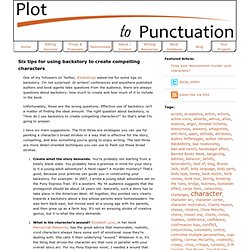
I’m not surprised. At writers’ conferences and anywhere published authors and book agents take questions from the audience, there are always questions about backstory: how much to create and how much of it to include in the book. Unfortunately, those are the wrong questions. Effective use of backstory isn’t a matter of finding the ideal amount. The right question about backstory, is “How do I use backstory to create compelling characters?” I have six main suggestions. Create what the story demands. 30 Ways to Write a Stronger Novel — Fiction Notes. Mike Shultz's Writing Lessons - Fantasy & Science Fiction Author.
One-Pass Manuscript Revision: From First Draft to Last in One Cycle. © by Holly Lisle All Rights Reserved The first draft of your novel is finished.
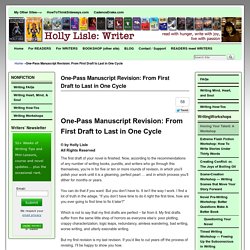
Now, according to the recommendations of any number of writing books, pundits, and writers who go through this themselves, you’re in for five or ten or more rounds of revision, in which you’ll polish your work until it is a gleaming, perfect pearl … and in which process you’ll dither for months or years. You can do that if you want. But you don’t have to. It isn’t the way I work. Which is not to say that my first drafts are perfect – far from it. But my first revision is my last revision. The Supply List. How to write fiction - practical advice - write advice online guide writing website write site fiction writing site creative notes by Hugh Cook. {*style:<b> Practical stuff - notes about the nuts and bolts of writing fiction. So you want to write fiction? Okay .... </b>*} {*style:<b> 2. Log time worked, eg "Started work today at 1pm, finished at 1.05pm, cumulative time worked today 15 minutes, cumulative time worked this week one hour. " Most common mistakes.
Tests Document Readability. Head Hopping and Hemingway. 50 Things a Writer Shouldn't Do & Three Guys One Book. DH: A list recently published in The New York Times by a noted restaurateur gave 100 rules for what service staff should not do.

29 Soundbites On Writing And Publishing. Nathan Bransford: Writer Wednesday: Do You Suffer From One of These Writing Viruses? Do You Suffer From One of These Writing Maladies?

There are pernicious writerly germs out there infecting pages all around the world. Left uncured they can be fatal. Talk to your book doctor or literary health provider if you notice any of these symptoms: Yoda Effect: Difficult to read, sentences are, when reversing sentences an author is. Cart before horse, I'm putting, and confused, readers will be. Overstuffed Sentences: An overstuffed sentence happens when a writer tries to pack too many things into one sentence in convoluted fashion, making it difficult for the intent of the sentence to come through and to follow it becomes an exercise in re-reading the sentence while making the sentence clearer in our brains so we can understand the overstuffed sentence, which is the point of reading.
Chatty Cathy: So, like, I don't know if you've noticed but OMG teenagers use so much freaking slang!!! Shorter Hemingway: Clipped sentences. Description Overload: Upon this page there is a period. Paradoxical Rules for Writers. Janet Fitch's 10 rules for writers. Janet Fitch is the author of "White Oleander" and "Paint it Black," and she teaches writing at USC. It seems like every time I run into her at a reading, she introduces one or two or more of her students who she has encouraged to come along, people whose work she praises. This enthusiastic engagement makes her, well, nicer than many writing teachers, and that niceness might be why she's posted a list of 10 writing tips that can help almost anyone on her blog. But the list shows that just because she's nice, she's no pushover in the classroom. The list -- intended for fiction writers but good for many of us -- is reprinted in its entirety below, with Fitch's permission. 1.
WRITERS ON WRITING; Easy on the Adverbs, Exclamation Points and Especially Hooptedoodle. A Novelr Primer: All We Know About Web Fiction. Top 10 ways to write an Anticlimax. An anticlimax is personally one of my most feared nightmares – it means you have to revise a major part of the novel, or at least put the climax on hold until you can figure out a way to make it bigger, better, more twisted and more shocking than anything you’ve thrown at the reader so far.
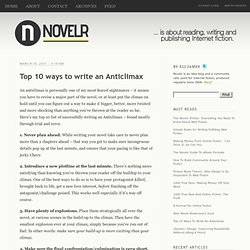
Here’s my top 10 list of successfully writing an Anticlimax – found mostly through trial and error. 1. Never plan ahead. While writing your novel take care to never plan more than 2 chapters ahead – that way you get to make sure incongruous details pop up at the last minute, and ensure that your pacing is like that of jerky Chevy. 2. 3. Tips on Writing a Memoir - LoveToKnow Freelance Writing. If you think you have an interesting life story to tell, LoveToKnow Freelance Writing is here to offer tips on writing a memoir.

Even if you're a novice writer, our advice will help you get your project off to a promising start. Memoir vs. Autobiography. How To Publish a Book & Writing tips & Five steps to follow in writing a novel & How To Publish a Book. Writing a book is no easy task, it is a complex process which involves planning, discipline, and time.

Writing your first book can get tricky because it is not always obvious where you should start from. So you want to be a writer. (More) tips for writing well (Austin Govella at Thinking and Making) Published Wed, Jul 8, 2009 by Austin Govella.
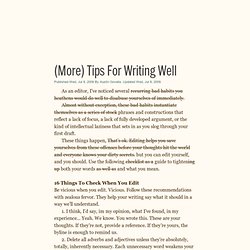
Updated Wed, Jul 8, 2009. As an editor, I’ve noticed several recurring bad habits you heathens would do well to disabuse yourselves of immediately. Almost without exception, these bad habits instantiate themselves as a series of stock phrases and constructions that reflect a lack of focus, a lack of fully developed argument, or the kind of intellectual laziness that sets in as you slog through your first draft. These things happen, That’s ok. Editing helps you save yourselves from these offenses before your thoughts hit the world and everyone knows your dirty secrets. but you can edit yourself, and you should. 42 Helpful and Terrific Blogs for Writers. 73 Ways to Become a Better Writer.
5 editor’s secrets to help you write like a pro. I do a lot of copyediting, both of books and advertising collateral.
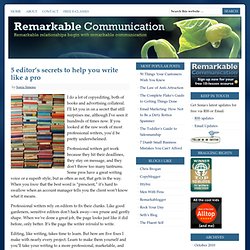
I’ll let you in on a secret that still surprises me, although I’ve seen it hundreds of times now. If you looked at the raw work of most professional writers, you’d be pretty underwhelmed. Professional writers get work because they hit their deadlines, they stay on message, and they don’t throw too many tantrums. Some pros have a great writing voice or a superb style, but as often as not, that gets in the way. When you know that the best word is “prescient,” it’s hard to swallow when an account manager tells you the client won’t know what it means.
Troubling.info. Eight rules for writing fiction: 1.
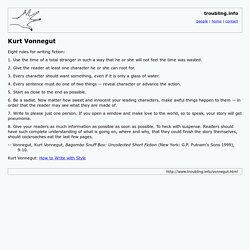
Use the time of a total stranger in such a way that he or she will not feel the time was wasted. 2. Give the reader at least one character he or she can root for. 3. Short Stories: 10 Tips for Creative Writers. The 18 Most Popular Articles on Writing of 2011. We posted more than 1,300 articles to WritersDigest.com this year and, quite frankly, that’s a lot.
It’s hard to sift through all of that, so I’ve gathered the 18 most popular articles to share with you—a mix of fiction, nonfiction, writer’s rights, agenting, publishing and a bit of humor. Bookmark these links and reference them as much as you need. There’s something for everyone here, so read on. Your manuscript and writing career will thank you. Without further ado, the 18 Most Popular Article on Writing of 2011: There’s no doubt that our staff worked tirelessly in 2011 to bring you advice, tips, interviews and inspiration to help you reach your writing goals.
I hope 2011 treated you well, but I’m confident 2012 is going to be even better. From the bottom of my heart, Brian. Daily Writing Tips. Articles - Pro Writing Tips. Top 25 Terribleminds Posts Of 2011. 40 Lessons Learned in Ten Years as a Freelance Writer : Freelance Writing J... Bad Novel Writing. Do you want to write a novel? Most people try to write a good novel and fail. Dare to be different.
Writing.